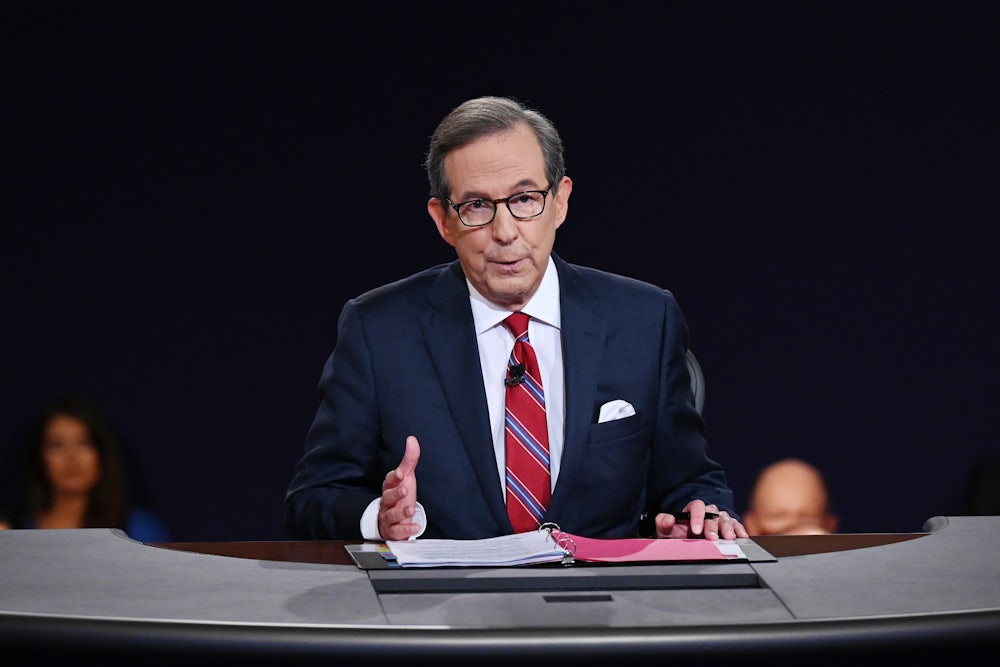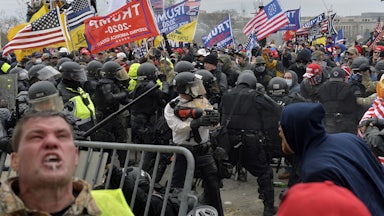On Sunday, with no warning, longtime Fox News anchor Chris Wallace announced he would be departing the network he’s long called his home, effective immediately. “After 18 years, I have decided to leave Fox,” he said during Fox News Sunday, the program he has hosted since he joined the network in 2003. “I want to try something new to go beyond politics, to all the things I’m interested in. I’m ready for a new adventure. And I hope you’ll check it out.” Soon after, it emerged that he would be hosting an interview program on CNN+, the Fox rival’s new streaming service.
While he was announcing his departure, Wallace took pains to note that Fox brass had promised never to interfere with his work when he first came aboard and had “kept that promise” during his nearly two decades there. That doesn’t mean that internal newsroom politics—and just plain politics in general—didn’t play a role in his decision to leave. Wallace’s departure may have been abrupt, but it was hardly surprising. A hard-news journalist of the old school, he was always something of an outlier at Fox, whose news division’s prominence has always been somewhat overstated.
But in recent years, Wallace had increasingly become something of an anomaly at a network that’s shed itself of journalistic pretensions—and actual journalists—in making a turn toward demagoguery. (It’s notable that Fox spent a significant portion of the airtime leading up to Wallace’s departure covering the torching of its own Christmas tree by a troubled homeless man, as if it were an attack on the country.) It was, moreover, recently reported that Wallace—along with fellow anchor Bret Baier—had objected to Fox News’s decision to air a Tucker Carlson–made propagandistic “documentary” about the January 6 riot at the Capitol that claimed, among other things, the event was a false-flag operation staged by the FBI. Ultimately, his departure is the clearest sign yet that Fox News’s transformation away from hard news is finally complete: Fox News’s opinion side has swallowed its news division whole.
Wallace, who has hosted several presidential debates, was invaluable for a network that has long used the fig leaf of respectability that its actual journalists provided as a way of laundering its real purpose: to aggressively push right-wing talking points and policies to its sizable audience. A sly and mischievous interviewer, Wallace was in some ways the perfect newsman for a network intent on insisting it still employed them: He relished setting traps and asking thorny questions to politicians from both parties. If you wanted an example of a journalist who both wouldn’t let up and treated representatives from both parties equally, you couldn’t do much better.
And while the bar is set quite low where Sunday morning political shows are concerned, Wallace was, among his peers, perhaps the most pugilistic interviewer of the genre, someone who relished a fight and whose bullshit detector was particularly sharp. Naturally, while there’s little reason to doubt that Fox executives ever pressured Wallace about his coverage, the Fox News Sunday panels nevertheless often reflected the network’s overriding rightward tilt, both in terms of composition and content.
Still, for Fox News, this was as close as you got to real news, and the respectability Wallace helped earn went a long way: While its late-night opinion programming gradually got more and more extreme, Wallace remained a steadfast presence. As he anchored Fox News Sunday and hosted key presidential debates—occasionally enraging Republicans along the way—executives always had someone to point to as proof that they were, in spite of everything else, still a news network.
But real news hasn’t been the network’s main interest in a long while—and Wallace’s continued presence has done less and less to project otherwise. Still, Fox can no longer pretend that it is a journalistic enterprise anymore. Its fear of being outflanked on the right by upstarts such as the One American Network and Newsmax, who’ve carved out their own audience of true believers with their willingness to suspend standards in service of Donald Trump’s cult of personality, has forced the cable news mainstay to sprint in some increasingly extreme directions.
Tucker Carlson, for example, now effectively has carte blanche to do virtually anything he wants, and the result has been an endless cavalcade of far-right content and the open promotion of things like the “great replacement” theory. Fox News’s White House reporter Peter Doocy uses his perch to push the network’s aggressive and frivolous culture-war stories—on Monday, for instance, he asked Jen Psaki about the aforementioned burning of the Fox Christmas tree. Increasingly, Fox focuses on matters that have little substance—about Dr. Seuss being “canceled,” for instance—but that do play to an audience convinced that their values are constantly under assault by cancel-culture warriors and socialists on the left. With Wallace gone, those stories will gain even more prominence, and the network will lose the one person left who would occasionally ask Republicans hard questions.
While it’s tempting to treat this as some pivotal moment in Fox News’s history, this isn’t really isn’t the case. Roger Ailes long ago conjured a vision of a news network that didn’t so much produce reporting as it did use current events to promulgate conservative agitprop—a business decision that helped it get the jump on its peers that were still bound by journalistic tenets. In that way, Fox had stopped having any ability to claim that it was a legitimate news channel a very long time ago. The hard news was always something of an accidental sideline. Wallace’s departure only pulls the mask off and confirms what has been true for years: It’s a propaganda network.










